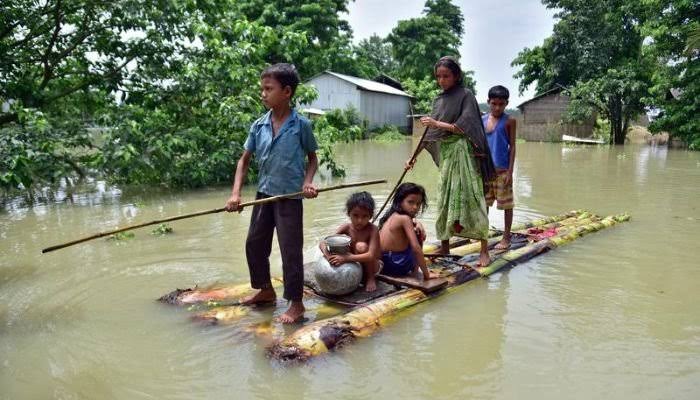The members of the local Muslim community have been blamed for the devastating flood that hit India’s northeastern state of Assam.
According to a report on Wednesday August 3, 2022, there was no truth to these allegations.
Police officers arrested one of the Muslims, Nazir Hussain Laska. They accused him of “damaging public property” — more specifically, an embankment meant to protect communities from flooding.
“I have spent 16 years working for the government to build embankments”, Laskar said. “Why would I damage one?”
Laskar spent nearly 20 days behind bars, before being released on bail. No evidence of his involvement has been found, but the social media storm around him has been raging ever since.
Two waves of flooding hit Assam in May and June, killing at least 192 people. While the state floods every monsoon, this year rains came early and were heavier than usual.
But for a number of social media users, something more sinister was at play here.
They claimed, without proof, that the floods were man-made, and that a group of Muslim men had deliberately inundated the neighboring Hindu-majority city of Silchar, by damaging flood defenses.
Laskar’s arrest, along with that of three other Muslim men, triggered a barrage of social media posts accusing them of supposedly waging a “flood jihad”.
These posts were shared thousands of times, including by prominent influencers with verified accounts. The claims were then repeated by some local media outlets.
A
But the gravity of his situation only dawned on him when, already in prison, Laskar caught a mention of his name on television: a news channel accusing him of “flood jihad”.
“I was afraid and could not sleep that night. The other inmates were talking about it. I thought I might get attacked.”
The construction of embankments has been central to flood management in Assam since the 1950s. The state has more than 4,000km (2,500 miles) of embankments and many of these are said to be brittle and prone to damage.
On 23 May, an embankment was damaged on the Barak River, which flows through north-east India and eastern Bangladesh.
The breach happened in a Muslim-majority area called Bethukandi – and it was one of several contributing factors to heavy floods in Silchar, which is majority Hindu.
“The cut was one of the causes”, says Ramandeep Kaur, superintendent of police in Silchar. “But it wasn’t the only point from where water entered the town.”
The BBC understands it was this particular incident that led to the arrest of Laskar and three other Muslim men. Later, a fifth man was also arrested. No evidence has been found linking any of them to the breach.
“A lot of these breaches take place because of the lack of repair and maintenance of the embankments,” said Nirmalya Choudhury, an associate professor at the Jamsetji Tata School of Disaster Studies in Mumbai.
“Some of it could be also human-induced. It could be that there were instances where people deliberately breached the embankment so that the water would move out, and would not flood their area.”
“There is no such thing as ‘flood jihad’,” said superintendent Kaur. “In earlier years, the administration would make a cut in the embankment themselves to drain the water out. This year it wasn’t done, and some people took it into their own hands.”
“To make this kind of claim [of ‘flood jihad’] is to take an easy way out,” said Prof Choudhury. “This is a managerial problem, and I think it requires a far more mature response.”

